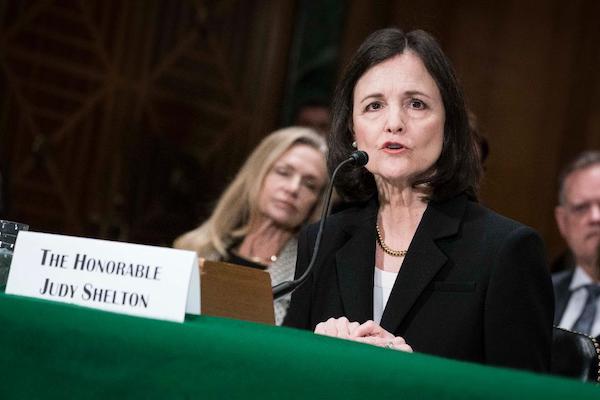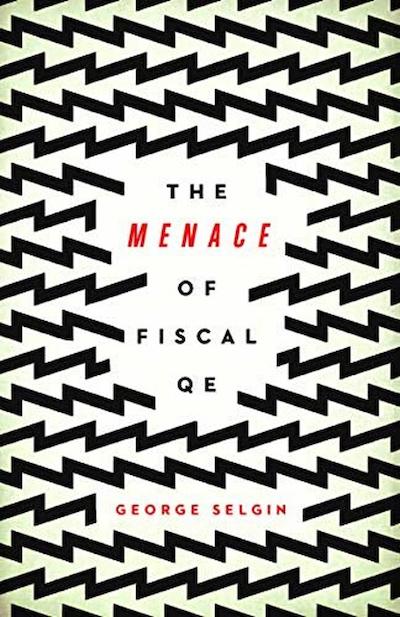(This item originally appeared at Forbes.com on March 9, 2020.)
With markets and economies in turmoil, probably the last thing you were thinking about is the pending appointment of economist Judy Shelton to the Federal Reserve Board of Governors. But, you should think about it.
Neither “easy money,” nor Keynesian-style public spending, can cure disease. But, they will try anyway. The gold market can already smell what is likely coming up. The dollar recently fell to seven-year lows vs. gold. Probably, this will involve the Federal Reserve purchasing Treasury bonds. Prices for these bonds (the inverse of yields) recently hit their highest in the history of the United States.

“What’s coming up” is described in a recent book by George Selgin, the excellent monetary economist at the Cato Institute’s Center for Monetary and Financial Alternatives. It’s called The Menace of Fiscal QE, and it came out in February 2020. Obviously, he wrote it before the recent concerns about infectious disease. But, the effect of that is to make the Menace that much more Menacing.

The systemic Federal budget deficit is already pretty big. An issue with infectious disease/financial problems/recession/depression would depress tax revenues while likely increasing total spending, leading to much bigger deficits. Probably, some of this Federal spending will be a good idea. Some kind of Federal financial assistance for airlines, hotels, or perhaps individual homeowners who are unable to work due to quarantine, is probably justified. But, to get this done, Congressional tradeoffs may involve funding of other giveaways and pet projects of dubious merit, and further bailouts of more business sectors and individuals that are less obviously worthy of assistance. We could end up with huge and bloated spending programs, just as took place in 2009.
This spending will likely be mostly waste. But whatever happens, I hope the Federal government will avoid reacting with an “austerity” response that involves higher taxes. When Europe tried that in 2010-2014, it was a disaster. Permanent tax cuts are the best “stimulus.” (I go into these fiscal issues in a lot more detail in my book The Magic Formula (2019)).
In any case, the Federal Reserve could come under a lot of pressure to finance these big deficits, basically with “the printing press,” or the Federal Reserve’s ability to purchase and thus “monetize” these debts. This is the “menace of fiscal QE.” The Federal Reserve has already been purchasing debt at an accelerated pace, which I think has been mostly justified, but this recent precedent can easily lead to the question: why stop there? Not only certain notorious Congresspeople, but also many economists don’t see any problem with sustained asset purchases, especially when it seems that “deflation” (economic distress leading to lower prices) is the current problem, not “inflation.” This can get out of hand very easily.
We need some resistance to these existing trends. As it turns out, we have someone who is just right for the job; and, coincidentally, is very close to getting the job. That is, of course, Judy Shelton.
Shelton is well known for her long-standing advocacy of the gold standard system, the primary monetary principle that the United States used for nearly two centuries until 1971. For some reason, her support for a system that worked very well for a very long time, ending in one of the most prosperous decades in U.S. history (the 1960s), is very controversial today. This is silly.
But, let me tell you a secret: we aren’t going to have a gold standard system in the U.S. anytime soon. Shelton will have to work within the existing policy framework of the Federal Reserve.
Within that existing framework, Shelton will likely trend toward the principle of “stable money,” which was also held, to some degree, by successful Federal Reserve governors Paul Volcker and Alan Greenspan.
Basically, the idea of “stable money” is that money should be stable in value, predictable, unchanging and neutral. It should be a universal constant of commerce, just as the kilogram or meter are universal constants of weight and length. Most people treat money this way anyway. The fact that our money today (floating fiat currencies) is actually not like this is called “the money illusion.”
In more practical terms: Shelton will help keep the Federal Reserve from going to full-on Fiscal QE Crazytown. Believe me, you want that.
Congresspeople today have a lot more to worry about than bickering about President Trump’s excellent choices for the Federal Reserve’s Board of Governors. Read Selgin’s new book, The Menace of Fiscal QE. Then, let’s approve of Judy Shelton’s nomination to the Board.

